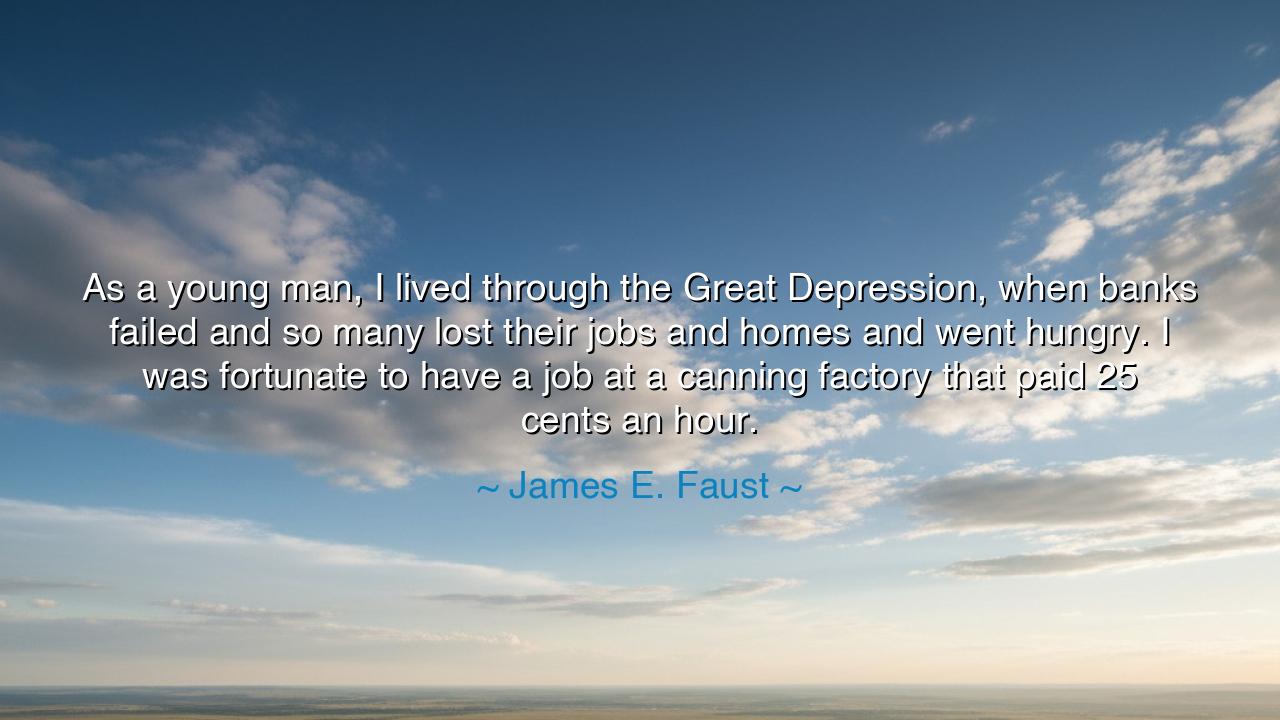
As a young man, I lived through the Great Depression, when banks
As a young man, I lived through the Great Depression, when banks failed and so many lost their jobs and homes and went hungry. I was fortunate to have a job at a canning factory that paid 25 cents an hour.






In the reflective and humble words of James E. Faust, we hear a voice shaped by struggle and gratitude: “As a young man, I lived through the Great Depression, when banks failed and so many lost their jobs and homes and went hungry. I was fortunate to have a job at a canning factory that paid 25 cents an hour.” At first glance, these words seem simple—a memory of hard times, a statement of fact. Yet beneath them lies a deep well of wisdom, drawn from the ancient truth that adversity is the forge of character. This is not merely a recollection of poverty, but a remembrance of endurance, humility, and the grace of gratitude. For those who have known scarcity learn to treasure even the smallest blessings.
The origin of this quote comes from Faust’s recollections as one who lived through the Great Depression, that vast shadow that fell over the world in the 1930s. In that time, banks crumbled, families were torn apart, and hope itself seemed to collapse under the weight of hunger and uncertainty. Yet amid that darkness, young Faust—who would later rise to spiritual leadership and global respect—found work in a canning factory, earning a mere twenty-five cents an hour. To many, that sum was little; to him, it was salvation. It was a lifeline, a proof that one could still endure, still contribute, still find dignity in honest labor. In that humble wage was hidden a truth the world too easily forgets: that meaning is not found in abundance, but in purpose.
The ancients knew this well. In every civilization, from the dust of Babylon to the marble halls of Rome, the wise have said that suffering refines the soul. Adversity, they taught, is not sent to destroy, but to awaken. A person who has never known need is like a tree whose roots have never touched rock—it grows quickly but shallow, and falls when the storm arrives. Yet the one who has struggled, who has fought for each breath of peace, becomes strong at the core. So it was for Faust, who learned early that life’s worth is not measured in gold, but in gratitude, resilience, and integrity.
Let us remember a story from those same hard years—the story of Dorothea Lange, the photographer who captured the face of the Great Depression. In her famous photograph, Migrant Mother, we see a woman, weathered and weary, staring into the horizon as her children cling to her shoulders. She had nothing, yet she endured. Her face spoke for millions, and through her image the world saw not despair, but courage. Like Faust’s quiet memory, her work reminds us that even in ruin, the human spirit persists. Dignity in hardship is the foundation of greatness.
Faust’s reflection also carries a subtler truth—gratitude is not born of comfort, but of contrast. Those who have known emptiness are the ones who truly value fullness. To say “I was fortunate” in the midst of poverty is an act of spiritual strength. It is to see light where others see only shadow. His gratitude for a factory job in desperate times teaches us that the measure of a man’s soul lies not in what he possesses, but in how he perceives what he has. The world will always know both feast and famine, but the wise heart finds contentment in either.
In our modern age of plenty, this teaching strikes like a bell in the distance, calling us to remember what we have forgotten. Too often we measure worth in wealth and happiness in comfort. But Faust’s story calls us back to the ancient path of endurance and humility. To work with one’s hands, to labor honestly, to give thanks for even a modest wage—these are not lesser virtues. They are the foundation upon which all other blessings are built. Without gratitude, even abundance turns to emptiness; with gratitude, even scarcity becomes sacred.
The lesson, then, is clear: we must not flee hardship, but learn from it. When life becomes difficult, remember that you are being shaped for strength. When you have little, be thankful for the little you have, for in that thankfulness lies the seed of peace. And when prosperity returns, do not forget the days when twenty-five cents was a treasure. For the soul that remembers struggle remains humble, compassionate, and wise.
So, my listener, take this to heart: greatness does not come from wealth or ease, but from the quiet courage to endure and to give thanks. James E. Faust looked back upon his youth not with bitterness, but with reverence—for it was in those hard days that he learned the eternal truth: that character is richer than coin, and gratitude is wealth beyond measure. May we, too, learn to see in our own hardships not despair, but the shaping hand of destiny, and may we rise from them as he did—stronger, humbler, and infinitely more grateful for the simple grace of being alive.






AAdministratorAdministrator
Welcome, honored guests. Please leave a comment, we will respond soon